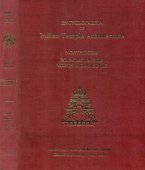Mandapika, Maṇḍapīkā: 9 definitions
Introduction:
Mandapika means something in Hinduism, Sanskrit, the history of ancient India. If you want to know the exact meaning, history, etymology or English translation of this term then check out the descriptions on this page. Add your comment or reference to a book if you want to contribute to this summary article.
In Hinduism
Shaivism (Shaiva philosophy)
Source: Brill: Śaivism and the Tantric TraditionsMaṇḍapikā (मण्डपिका) refers to the “pavilion (of power)”, according to the Brahmayāmala-tantra (or Picumata), an early 7th century Śaiva text consisting of twelve-thousand verses.—Attainment of direct, power-bestowing encounters (melaka) with the goddesses is one of the Brahmayāmala’s dominant ritual aims, as illustrated by the “rite for the mastery of vetālas” (vetālasādhana, ch. 15), “rite of the great churning” (mahāmanthāna, ch. 46), “pavilion of power” (siddhi-maṇḍapikā, ch. 47), and “worship in the pit [of power]” (siddhigarttāyāga, ch. 48). These virtuoso and macabre performances may culminate with the goddesses manifesting bodily before the sādhaka and granting boons.

Shaiva (शैव, śaiva) or Shaivism (śaivism) represents a tradition of Hinduism worshiping Shiva as the supreme being. Closely related to Shaktism, Shaiva literature includes a range of scriptures, including Tantras, while the root of this tradition may be traced back to the ancient Vedas.
India history and geography
Source: Cologne Digital Sanskrit Dictionaries: Indian Epigraphical GlossaryMaṇḍapikā.—(EI 1, 3, 33), customs house; same as śulka- maṇḍapikā (Ind. Ant., Vol. XI, p. 339 and note 31). See Ghoshal, H. Rev. Syst., pp. 238-39. (EI 3; CII 4); market; a market pavilion. (CII 4), a small temple. Note: maṇḍapikā is defined in the “Indian epigraphical glossary” as it can be found on ancient inscriptions commonly written in Sanskrit, Prakrit or Dravidian languages.
--- OR ---
Māṇḍapika.—(IE 8-2), cf. Prakrit Maṃḍavika (EI I), officer in charge of a maṇḍapikā or customs house; a collector of tolls. Note: māṇḍapika is defined in the “Indian epigraphical glossary” as it can be found on ancient inscriptions commonly written in Sanskrit, Prakrit or Dravidian languages.

The history of India traces the identification of countries, villages, towns and other regions of India, as well as mythology, zoology, royal dynasties, rulers, tribes, local festivities and traditions and regional languages. Ancient India enjoyed religious freedom and encourages the path of Dharma, a concept common to Buddhism, Hinduism, and Jainism.
Languages of India and abroad
Sanskrit dictionary
Source: DDSA: The practical Sanskrit-English dictionaryMaṇḍapīkā (मण्डपीका).—
1) A small shed, shop.
2) A small pavilion or tent.
See also (synonyms): maṇḍapaka.
Source: Cologne Digital Sanskrit Dictionaries: Benfey Sanskrit-English DictionaryMaṇḍapikā (मण्डपिका).—i. e. maṇḍapa + ka, f. A small shop, [Hitopadeśa] 115, 1, 9.
Source: Cologne Digital Sanskrit Dictionaries: Cappeller Sanskrit-English DictionaryMaṇḍapikā (मण्डपिका).—[feminine] small pavilion or shed.
Source: Cologne Digital Sanskrit Dictionaries: Monier-Williams Sanskrit-English DictionaryMaṇḍapikā (मण्डपिका):—[=maṇḍa-pikā] [from maṇḍa-pa > maṇḍa > maṇḍ] f. a small pavilion, an open hall or shed, [Kādambarī; Bālarāmāyaṇa]
Source: DDSA: Paia-sadda-mahannavo; a comprehensive Prakrit Hindi dictionary (S)Maṇḍapikā (मण्डपिका) in the Sanskrit language is related to the Prakrit word: Maṃḍaviā.
[Sanskrit to German]
Sanskrit, also spelled संस्कृतम् (saṃskṛtam), is an ancient language of India commonly seen as the grandmother of the Indo-European language family (even English!). Closely allied with Prakrit and Pali, Sanskrit is more exhaustive in both grammar and terms and has the most extensive collection of literature in the world, greatly surpassing its sister-languages Greek and Latin.
See also (Relevant definitions)
Starts with: Mandapika-adaya, Mandapika-karana, Mandapika-pattaka.
Ends with: Shulka-mandapika, Siddhimandapika.
Full-text: Mandavi, Mandapika-pattaka, Mandapaka, Mandapika-karana, Mamdavia, Shulka-mandapika, Mandavo, Mandai, Shulkashala, Mandapa, Karana.
Relevant text
No search results for Mandapika, Manda-pika, Maṇḍa-pikā, Maṇḍapīkā, Maṇḍapikā, Māṇḍapika; (plurals include: Mandapikas, pikas, pikās, Maṇḍapīkās, Maṇḍapikās, Māṇḍapikas) in any book or story.
Related products
